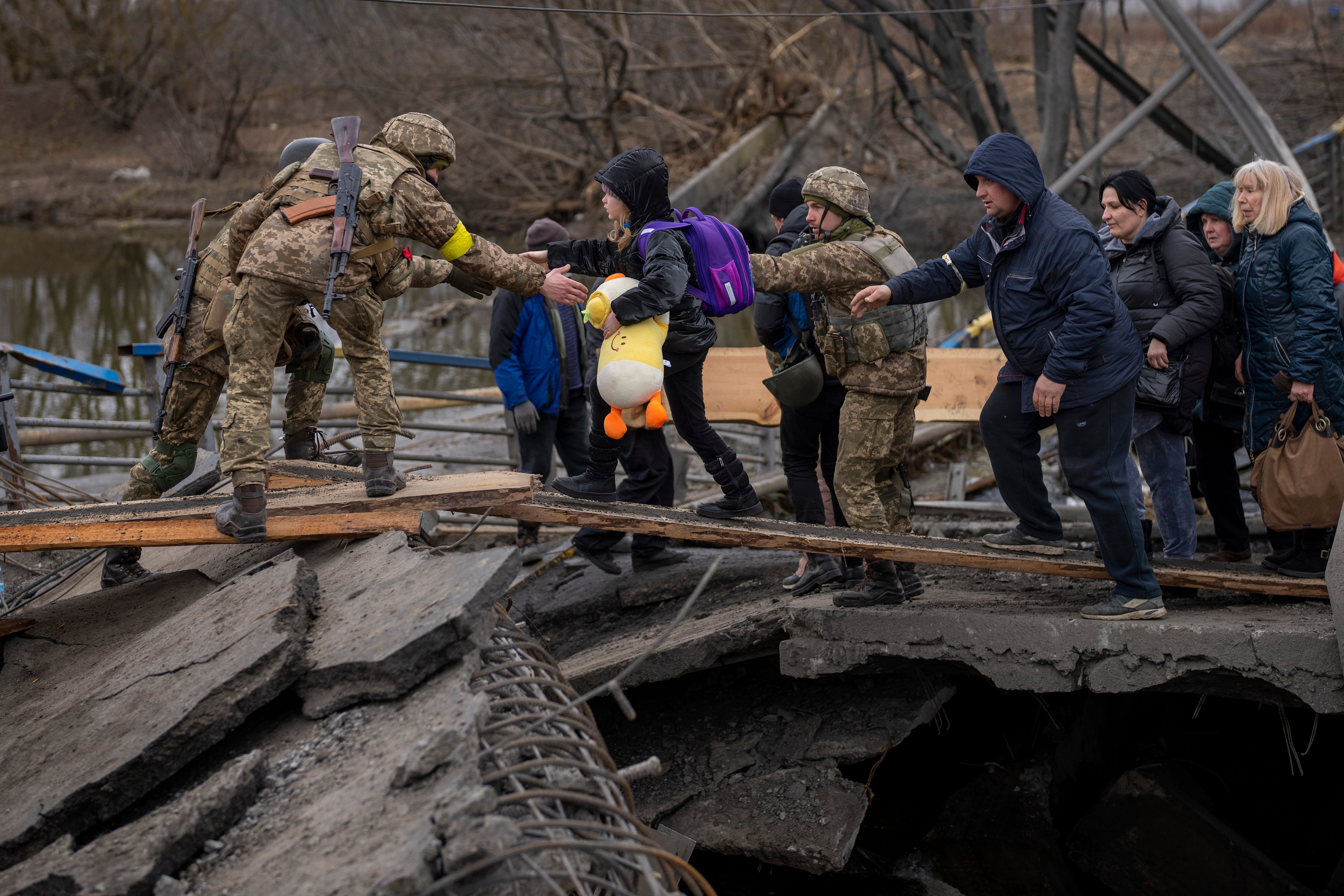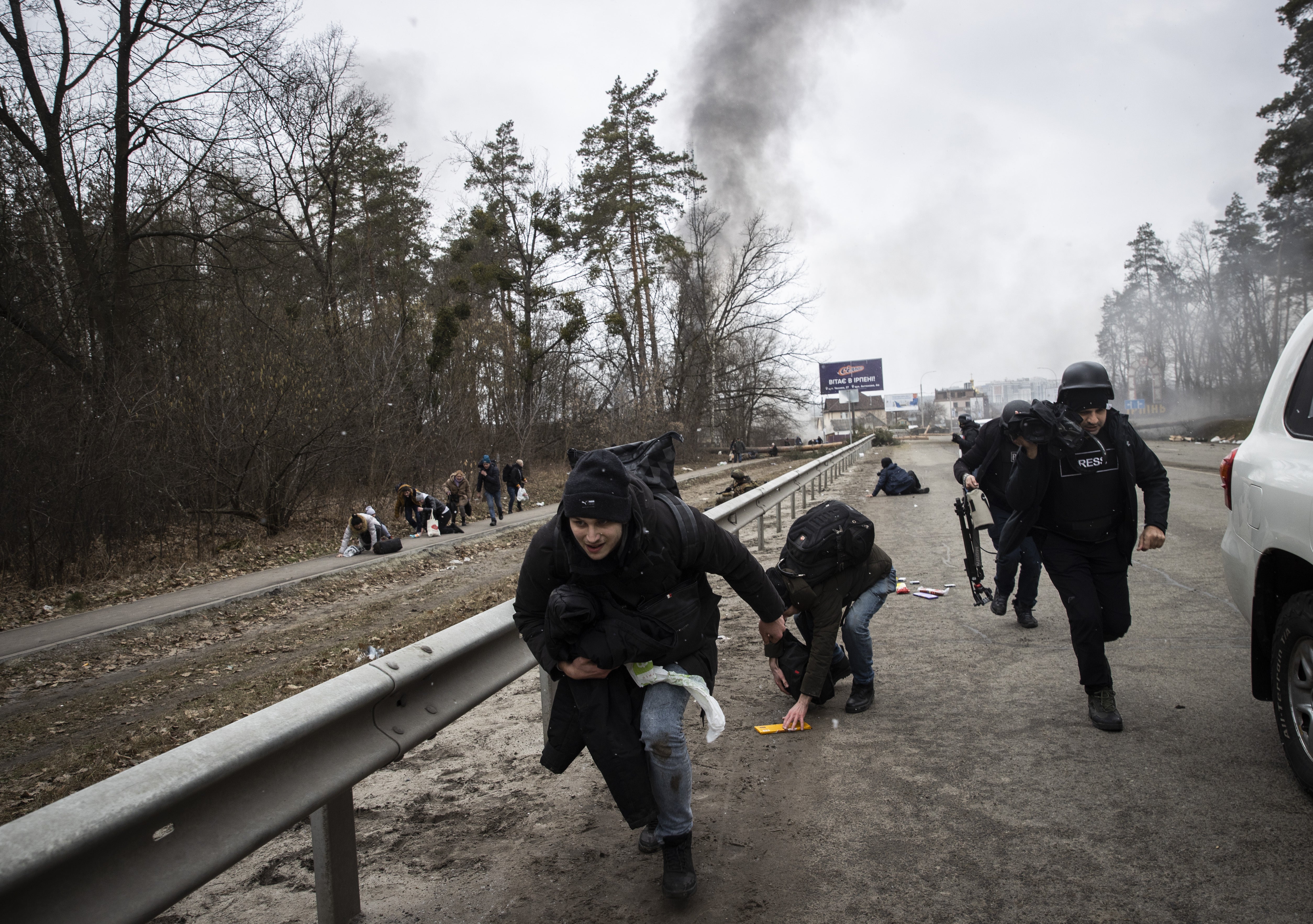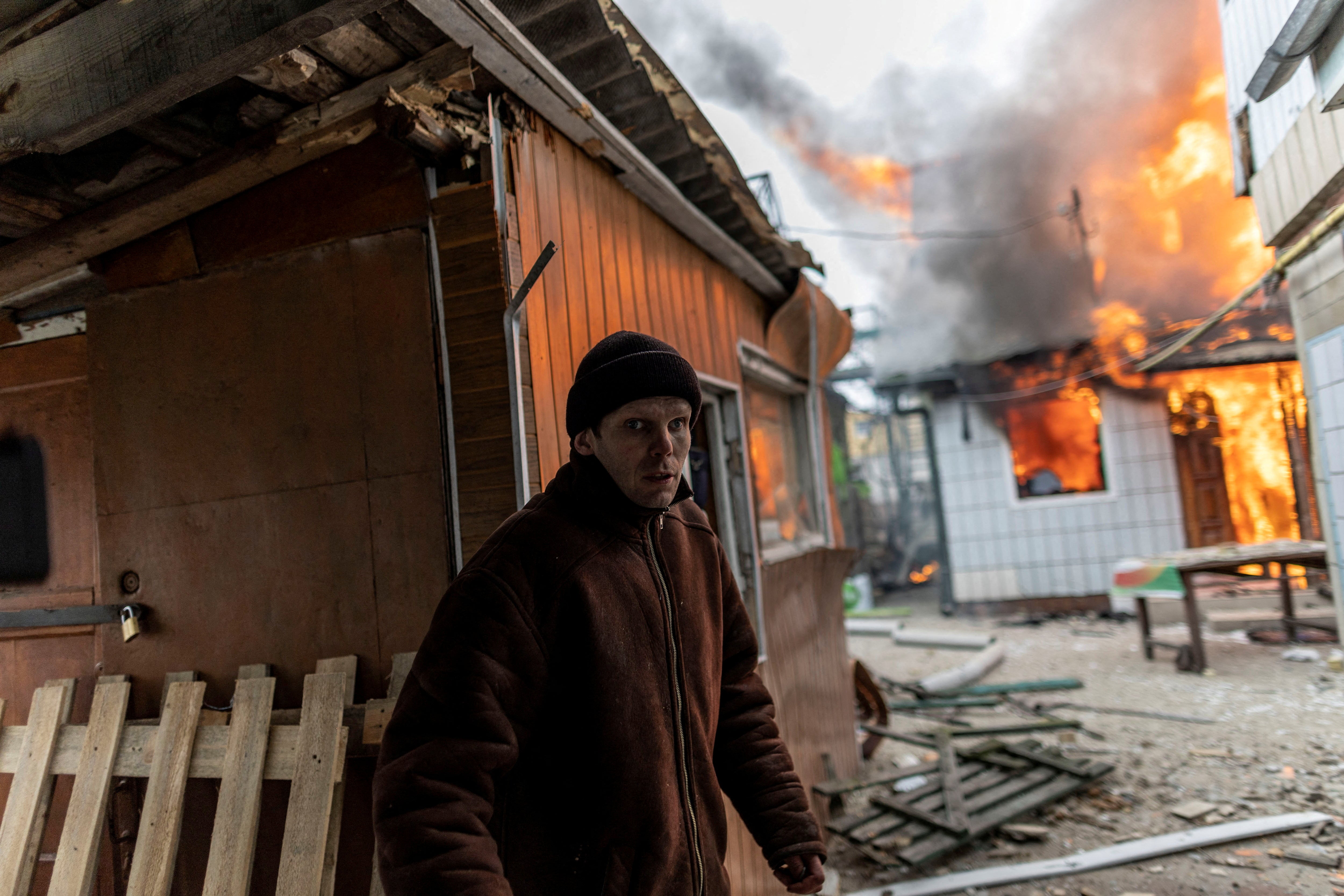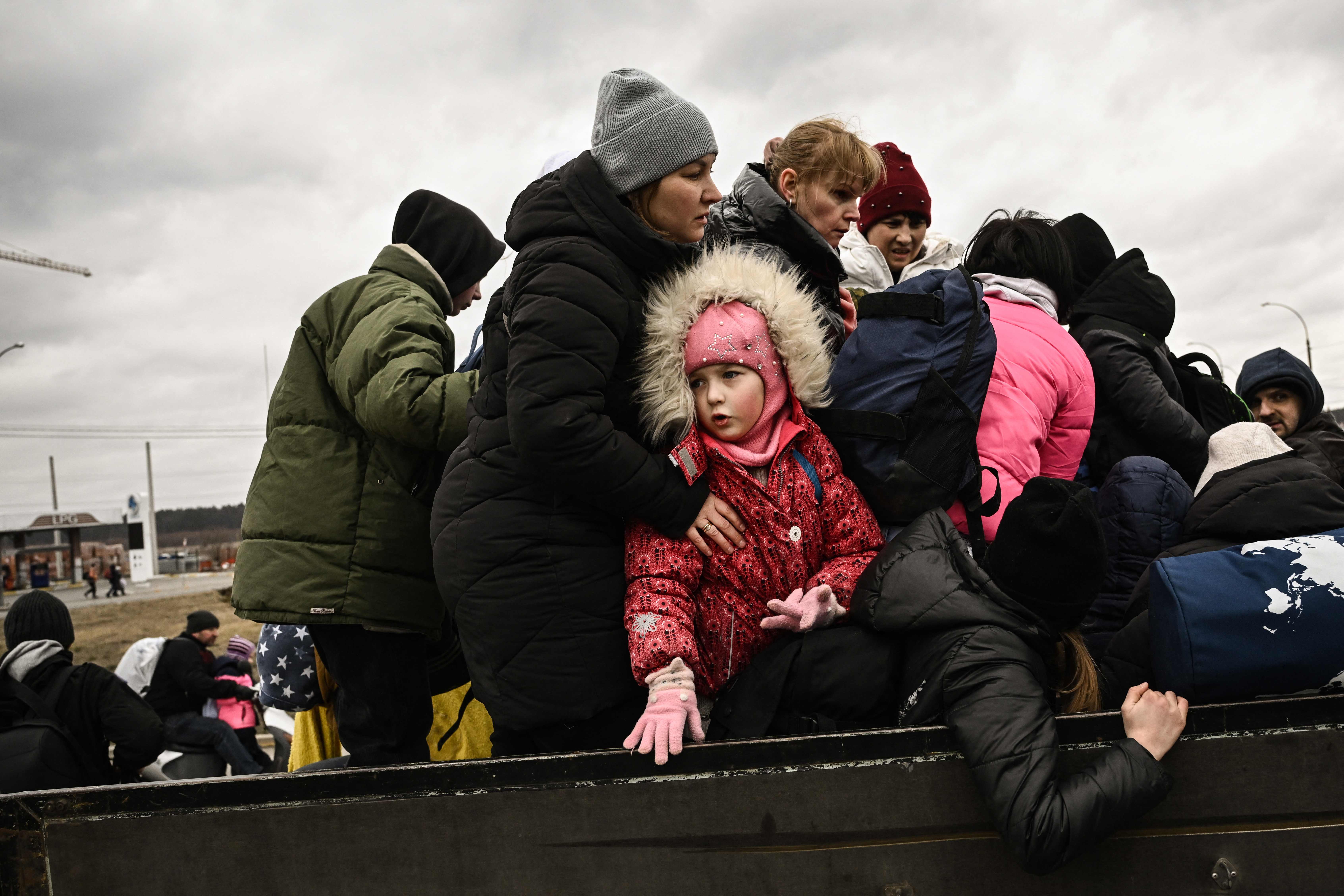Trapped: The battle to escape Putin’s wrath
Kim Sengupta reports from Irpin, a prime target for Russian forces trying to encircle Kyiv, where civilians face a life-or-death struggle to escape the conflict


The emergency packages of food and water had been delivered and the evacuation process was under way. But then, suddenly, shellfire erupted bringing with it widespread panic as people began to scramble out of the bus, which was due to take them to safety.
The civic society activists, who had come to Irpin to collect civilians, pleaded with them to get back on board, saying they would be trapped behind enemy lines otherwise. But the families, calling out to each other, with children crying and pet dogs barking, ran to a church nearby – and soon it was too late for them to escape.
The roads out of the district of Slayvo – “Radiance” – was being cut by Russian troops who had come through a wood. The Kyiv activists were now themselves desperate to get away, fearing the worst if they were to fall into Russian hands. They roared away in their cars, the bus left behind.
But within minutes, two local cars ahead of them were hit by mortar fire, forcing them into screeching U-turns. Three people, one of them a child, are reported to have been found in the burning wreckages.
The fighting was in Irpin, a town of 62,000 which sits about 20km (12 miles) to the northwest of Kyiv, which has become a prime target for Russian forces trying to encircle the Ukrainian capital. The city has been battered by prolonged missile strikes and artillery fire, with intense firefights, as Ukrainian troops try to claw back streets and districts.
The confrontation has become increasingly fierce here and in Bucha, the next town to the north, as well as Hostomel Airport, where a Russian military contingent of tanks and armoured cars – the forward elements of a 64km-long convoy (40 miles) – has been gathering with the aim of an eventual assault on the capital.
I had joined the relief convoy to Irpin, organised by the volunteer activists, during warnings of an impending large-scale Russian assault on the town. Half a dozen cars and the bus had taken back roads through villages into the town. The main route in and out of Kyiv is blocked by a destroyed bridge over the River Irpin, a tributary of the Dnieper.
It is unclear whether the bridge was hit by Russian airstrikes or blown up by the Ukrainians in an effort to slow down the enemy advance. Either way, the Russians will no longer have direct access to the P30 motorway which runs into the capital.
The destruction inside the town was considerable, stretching from the outskirts to the centre, with burnt-out cars and buildings, some still smouldering from recent attacks. Quite a few of the targets were in residential areas, with large apartment blocks among the places hit. Video footage, confirmed by independent analysts, showed Russian Su-25 warplanes carrying out strikes in the city.
People in the Slayvo district had stayed in their homes with gunfire all around them for days. Many of them have sought shelter in the crypt of the Irpin Bible Church. Roman Ilniktsky, a priest there, said before the artillery rounds started “some have moved here from their homes, others just come for the night”.
He said: “We have been collecting food from the town and it’s very good to have donations coming here from Kyiv. It is up to people to decide whether they want to stay here or go, it may make sense to go, but some people would be nervous travelling.”
Yuri Radchenko, 68, was helping his 64-year-old wife Katarina into the bus when the clumps of mortar rounds began. “Get everyone into the bus and let’s go, they are coming,” he shouted at the by then very nervous driver. “Come on, we haven’t got much time.”

But by then people had begun to disembark. Katarina suddenly broke down. “We can’t go, we can’t go, my love,” she said to her husband between sobs. “It’s not safe to go, we don’t know what’s going to happen on the road, I am too frightened.”
Viktoria Kravets, carrying a baby and a cat in a cage, and dragging her two young daughters into the church, had been desperate to leave.
“But now there is too much confusion, and I don’t think it’s going to be possible this time. I wish we could go, it has been terrible around here with all the rockets and shooting,” she said.
“My girls get very frightened. What is happening is not good for them psychologically, they have seen people getting injured. They miss their father and their grandparents.”
The grandparents had moved to the relatively safer western Ukraine; the father, Ihor, was in the army reserves, and has been deployed towards Kharkiv, where another Russian offensive is taking place.
“Putin wants to destroy us. I am very proud that my husband is fighting for Ukraine, for our country,” she said. “He is trying to organise for us to get out, so we shall see what happens, all this waiting around has made the roads unsafe now. Maybe we should have taken the train, but that’s not possible now.”
A few trains had been running intermittently to Kyiv, with seats reserved for women and children. No men were allowed – a few who had attempted to board carriages were arrested and removed. But that link out of town ended with missile strikes on the tracks on Saturday morning.
Ms Kravets and others hurried on as machinegun fire started nearby. A group of Ukrainian soldiers rushed towards the location it was coming from. Then three civilians came holding beer bottles in their hands. They were Molotov cocktails, which they slung a little later at Russian positions further down the road. “They are really frightened of these,” one of them shouted grinning as he ran past.

A volunteer Ukrainian fighter, crouching behind a wall with an AK-47, said: “He is right, these Molotovs are old fashioned, but they are very useful.” The Ukrainian soldiers returned and then fell back, disappearing up the road.
Leaving Slayvo district, with Russian gunfire getting closer, we took the back route towards Kyiv in our car before an explosion to the front brought us to a juddering halt. It was a military vehicle which had been hit and set on fire. The Ukrainian soldiers who emerged around us from ditches beside the road said it was a Russian MT-LB armoured personnel carrier leading in troops.
Soon afterwards the Ukrainians captured a Russian soldier, who sat in his black top and combat trousers on the rubble-strewn steps of a shop, his hands tied behind his back. The young man, fair-haired and pink-faced, looked worried, giving a hopeless shrug in answer to questions. The Ukrainian soldiers maintained that he would be treated fairly as a prisoner of war: “Geneva Convention,” said one, “he won’t be harmed”.
The only way back by then was to the destroyed bridge. The approach road was filled with parked cars left by those who had forded the river on foot. There was renewed shooting back in the town, and more and more residents came hurrying along to get away.

Some had injuries; one limping man was being supported by his brother. He had been hit by shrapnel from what sounded like a howitzer round about 500 yards away. An ambulance was coming to the other side of the bridge, said a soldier, to take him and other casualties to hospitals back in Kyiv.
A young captain, also bandaged, around his left arm, said: “People don’t want to leave their homes, everything they have built up. But the Russian attacks are now continuous. We will have to retake the areas they have moved into, and so maybe not having too many civilians in the city now, that will mean fewer civilian casualties.”
The officer, who wanted only his first name, Mykhailo, published, continued: “We know the Russians are desperate to get control of Irpin, that is why they are putting so much resources into it. They are not doing well on the ground and that’s why we have so many airstrikes and the long-range shelling.”
Shelling intensified as dusk began to fall, and the crowd took shelter under the remaining arch. Flares went up in the sky followed by red darts of exchanged fire and flashes as buildings, closer and closer, began to get hit.

The crowd swarmed to cross, with difficulty, over the twisted metal and smashed stonework, over the water. Groups huddled together, many carrying packed plastic bags, rucksacks and suitcases, some with children on their shoulders.
An elderly woman slipped and fell. Helping her up, Andriy Osadchuk, a volunteer military radio operator, exclaimed: “Can you imagine someone having to go through all this at her age? Why are the Russians doing what they are doing? It’s barbaric.”
After being hauled up on the side, the elderly woman spoke briefly, shook her head and began the long trudge up the road.
“She said she’ll never see her home again,” Mr Osadchuk reflected. “That’s probably true, it’s very sad.”
The Independent has a proud history of campaigning for the rights of the most vulnerable, and we first ran our Refugees Welcome campaign during the war in Syria in 2015.
Now, as we renew our campaign and launch this petition in the wake of the unfolding Ukrainian crisis, we are calling on the government to go further and faster to ensure help is delivered. To find out more about our Refugees Welcome campaign, click here.
To sign the petition click here. If you would like to donate then please click here for our GoFundMe page
Join our commenting forum
Join thought-provoking conversations, follow other Independent readers and see their replies
Comments

Bookmark popover
Removed from bookmarks